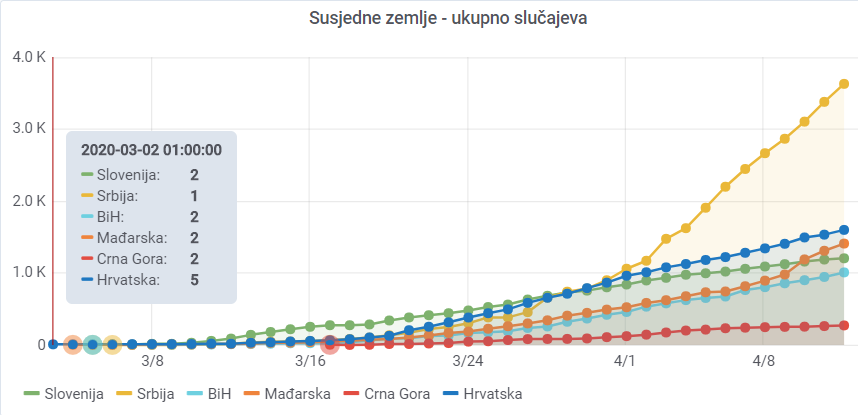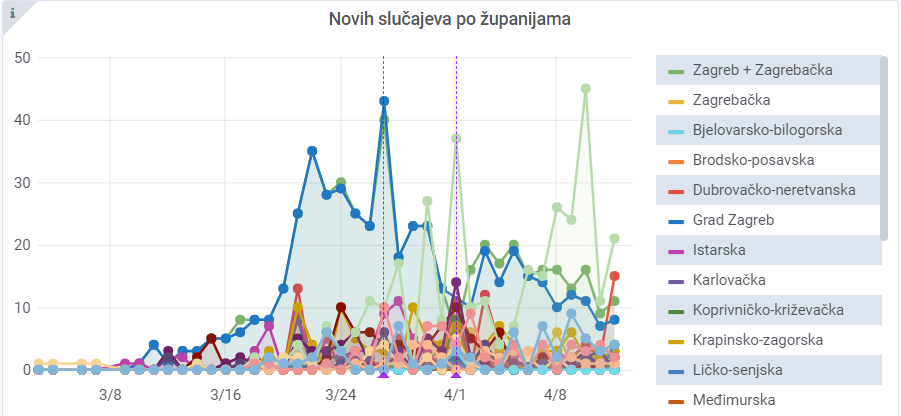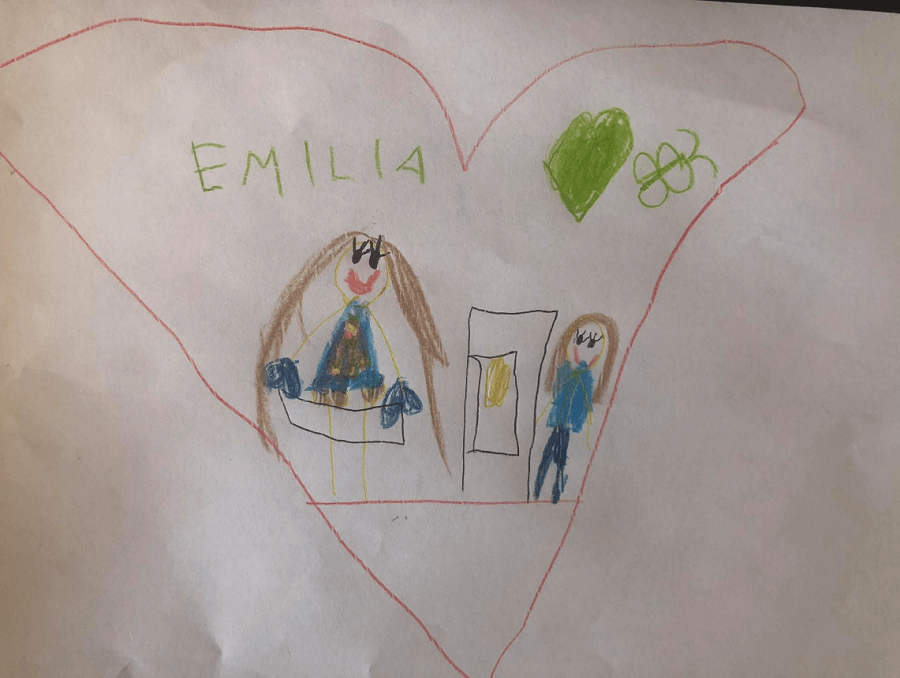Dealing with COVID-19: Small Tourist Business Stories from Split
April 13, 2020 - How are small tourism businesses dealing with COVID-19 in Croatia? TCN's UNESCO correspondent on the changing realities in the two tourism businesses in Split which feed her.
It’s hard to say anything that’s not already all over the news about this unprecedented situation happening worldwide. In essence, we all follow the daily press conferences and updates on numbers of COVID-19. One thing is for sure, this Spring did not start the way any of us planned. We are all mostly working from home if we are working at all, limiting our social interactions, and avoiding leaving the house if not necessary.
This piece will look at the changes happening for two small businesses working in tourism in Split. Maybe not all similar companies are going through the same issues, but it might speak for most of them as we all face sadly the same problems. I work as a hotel manager of a small city centre hotel, and I’m the owner of a small tourist agency focusing mostly on food and wine tours. I need to admit my daily business motivation is changing almost daily in the last few weeks, and most of my work is dealing with cancellations and guests saying they can’t go on their long-planned vacation.
At the end of February, which seems like ages ago, I think most of Croatia, including me, didn’t take COVID-19 as seriously as we should have. In terms of work in tourism, I had isolated cases of canceled bookings, which were mostly for March. I even had hotel guests from Asia who were supposed to come to Split mid-March, and they asked if they would experience any racism in Split – I assured them this wouldn’t be the case. If they are ready to travel to Croatia, the hotel will be more than happy to welcome them. As you might assume, in the meantime, they needed to cancel cause all of their flights were canceled.
In the first week of March, when it comes to bookings and reservations, nothing seemed to indicate that things would escalate, or at least it seemed to be something happening far away from Split. Also, just a few cancellations, nothing more than usual. The second week of March brought a more serious approach on global and local levels. COVID-19 was declared a pandemic, and there was mandatory self-isolation proclaimed for numerous countries. From the side of the hotel business, we mostly had cancellations for the whole of March and several for April. The tourist agency had cancellations for the entire April and May – literally the entire preseason was down the drain.
The third and fourth week was just something that we all expected – almost the whole of April canceled; 30 % of May reservations withdrew, with more and more clients canceling summer dates. Luckily there were some rebookings, and that’s a small light of optimism in a sea of canceled reservations and mails starting with “We are sorry to inform you but due to the COVID-19 situation we need to cancel our reservation…” All tourism and hospitality businesses have experienced this situation in the past month.
After the first state of shock and fear due to health reasons, shock and fear transferred to the fact we are facing losing not only preseason but potentially the whole summer season, not to mention all the economic impacts on tourism and other industries. Tourism businesses are already suffering from the economic effects of COVID-19 on our lives. With pandemic dynamics and the fact there is no vaccine or cure, this is something that only logical to happen. In this situation, not many would want to travel, and if they would go somewhere, they can’t do it due to travel restrictions – I had a case of few optimistic clients, but this got canceled too. If we assume, we flatten the curve, some restrictions will be milder or removed, but people will still be cautious. At this moment, the majority of clients who had reservations till the end of June are rebooking their accommodation and tours for autumn or next year.
All this doesn’t sound like the summer we are used to having here in Split, and any other tourist destination has the same issues. Also, it’s not something we can influence or know when it will be over. As a business in this situation, we can’t do a lot, but a few things a small tourist business can do are the following:
- • Adapt your business to a new situation – work with all precautions and safety measures
- • Offer clients a flexible cancellation policy or rebooking
- • Prepare the prices and promotions for summer months and postseason - by some predictions this could be the time when we could expect fewer travel restrictions
- • Be ready to offer discounts and change price strategy
- • Be present but not aggressive with marketing as this is not the time to sell vacation
- • Be kind and understand clients and answer quickly to inquiries
- • Be in touch with partners agents and hotels – they are going through the same stressful situation
- • Analyse your current business situation and project your future cash flow and income
- • Keep your staff if you can and be honest with them about the situation
- • Apply for state-supported or other measures that could help your business
When this is over, inevitably, there will be people willing to go on vacation, and with some preparation now, we could attract them first to the destination and then to our business. Tourism, although it is the first to be affected by negative impacts it will be the first back on its feet – now we need to deal with preserving our health as well as the health of our families. As everything this will be over at some point – we need to keep sane, safe, and follow the instructions we have from health officials.
If you would like to dream a little about your next Split holiday, here is what Filipa's agency specialises in.
For more on being prepared for the post-corona reality, Zoran Pejovic of Paradox Hospitality has written an excellent series for TCN.
Croatian Daily COVID-19 Testing Stats, Regional Curves & More: Stunning from Velebit.Ai
April 13, 2020 - A fabulous new addition to those looking for the latest and most details COVID-19 stats from Croatia. It doesn't get more detailed that the info put out by Velebit.ai. Does it?
It is just 35 days - and yet several lifetimes ago - since TCN produced the first corona map of Croatia on March 9, 2020.
I like to look at it from time to time - things didn't seem too bad back then, did they?
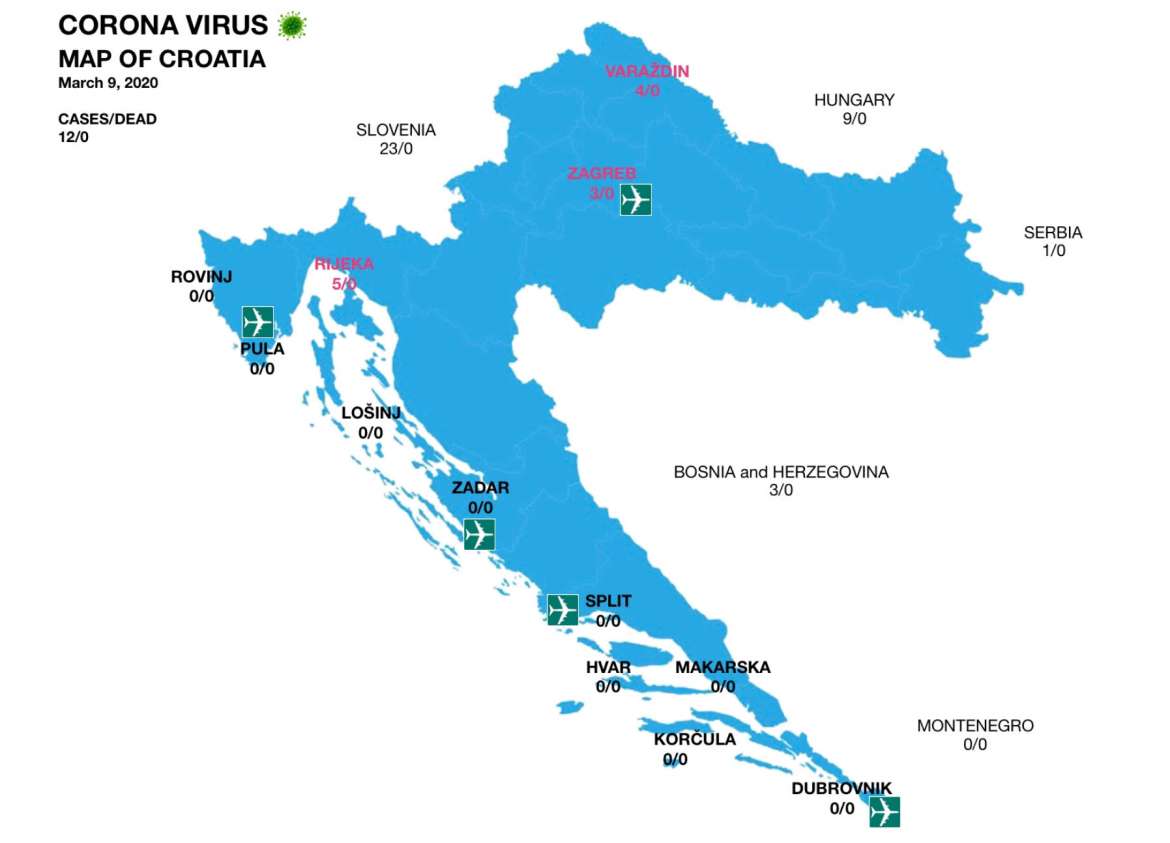
The response was huge, and it is the second-most popular article on TCN this year after the Zagreb earthquake.
And, as with most of the good stuff on TCN, the first corona map of Croatia had nothing to do with me.
"You know what is hot right now?" asked my clever Venezuelan colleague, Gustavo Vilera. "Corona maps. People want to see where the cases are. There is no corona map of Croatia."
Since I have no idea how to add text to a picture, the likelihood of me designing a corona map was less than zero, but my wife is much better at these things and most other things as well.
Working on her iPad and without any sophisticated software, she produced a very credible effort, which she updated daily for us until Index and then Koronavirus started doing theirs.
Since then of course, Index, then Koronavirus.hr and many others started adding their own statistics, maps and charts. And with much bigger resources and access to information than TCN, the information flow has improved considerably.
And now THIS!
Someone sent me an email about the COVID-19 info available via those clever Croatian AI chaps over at Velebit.ai, and it sits unread like 487 other messages I need to get to when I get to it. But then someone mentioned it to me again yesterday, and I took a look. Wow!
Corona stats junkies, we have just filled your day. Really great info on a number of things previously unavailable, such as how many tests is Croatia conducting, how do Croatian curves compare to those in the region (wouldn't that sentence have a different meaning in a different era...), and how are the cases developing by region in Croatia.
All that and MUCH, much more over on the Velebit.ai coronavirus page.
COVID-19 Repatriation Stories: Singapore to Mauritius, South Africa & Zagreb
April 13, 2020 - With the sudden lockdowns and flight restrictions last month, there were many desperate COVID-19 repatriation attempts. Read how Bojan Mirkovic's idyllic 3-week African holiday from Singapore turned into a very different 3-week African experience ending in an unexpected return to his homeland.
From the TCN inbox on Easter Sunday.
Spring break is a time of the year when we choose to travel to destinations at the top of our bucket list. For Spring break 2020 plan was to visit the African continent finally. Our three-week itinerary originally was:
Singapore ➡️ Mauritius ➡️ South Africa (Cape Town) ➡️ Namibia ➡️ Zambia ➡️ Botswana ➡️ Zimbabwe ➡️South Africa (Johannesburg) ➡️ Singapore.
I spent at least a hundred hours last November by computer to properly plan this entire trip, choose destinations, make all the visas and book all the flights, hotels, rent-a-cars, day trips...(I considered it more like a project than a trip).
By the time we are heading to Mauritius, the situation with COVID-19 in Singapore was stable, and life went on as usual. Also, at that time, there was no Coronavirus in the Southern part of the African continent at all. All the countries we were planning to visit had zero cases. Africa seemed to be spared by this enemy.
Of course, we were all the time closely monitoring what was going on with the virus in our home countries, in Europe in general, and other parts of the world where numbers of confirmed cases were growing rapidly. So we made plan B...and C...just in case something went wrong.
We landed safely in Mauritius, enjoyed exploring a paradise island, and really had a blast on gorgeous beaches and resorts around the country. After a couple of days, the situation started changing fast. The virus came to the island. Apparently, two tourists that came from the last cruise ship had no symptoms but were carrying the virus. They spread it to their local tour guy, who went to a local funeral....numbers started growing fast, and the country went into lockdown. ??
We wanted to come back immediately to Singapore and cancel the rest of our African adventure. But that wasn't possible anymore. At the same time, the situation with COVID-19 in Singapore wasn't stable anymore. There was a spike, and everything changed, so the government implemented a lot of new measures to fight the spread of the virus. One of those was that all foreigners returning to Singapore must get approval first from the Ministry of Manpower before returning. We immediately started working on it and submitted all the forms. But our approval was rejected. Too many people were trying to get back. We kept trying....did it all over again every single day, wrote to the Ministry of Manpower, tried with the appeal as well. But no - it was still rejected.
Meanwhile, we managed to leave Mauritius with the last possible flight! The government was shutting down not just restaurants, bars, and hotels, but the airport as well! The destination was Cape Town. And it seemed great. Anyway, we had visas, booked accommodation, life there was going normal, and it was still a period before the crisis. Just like on Mauritius the week before, we had a couple of days to enjoy the new destination. Great city, a lot of things to see and do, perfect weather, great restaurants....all good...we had time to go to the Cape of Good Hope, spend some time with African penguins, explore the city,...but then, the president announced lockdown of South Africa for three weeks and gave people two days to prepare for it! Again, restaurants, bars, hotels, airports, everything - shutting down. Only pharmacies and supermarkets would remain open.
Meanwhile, all these days, we constantly kept applying to get approval to come back to Singapore.
It took a lot of time, money, and effort but again we made new plans for leaving Africa. We even had three plane tickets at the same moment!
Second - we also had a ticket to go to Windhoek, Namibia, as part of our original itinerary. It was just before the lockdown of South Africa... But we were not able to board that flight either. Why? Namibia, that same day went to lockdown as well!
The third ticket was - to Zagreb, Croatia. The situation there at that time was chaotic. In addition to the fight with Coronavirus, my hometown was hit by several strong earthquakes! As we had no option, we decided to fly to Croatia.
So, between choosing to get stuck in Namibia, Dubai airport, or South Africa - we decided to stay in lovely Cape Town. We love the city. ??
Lockdown started. Luckily, we had fantastic accommodation - a beautiful villa with a nice backyard, swimming pool, excellent breakfast, and situated in the best part of the city. We chose this over any hotel as we wanted to stay at some nice and clean place with fewer tourists to reduce the risk of getting a virus. So we were ready to pay more for it. When we were booking it, we had no idea it was going to be for so many nights. The owners reduced the price as they knew we had no choice and what the situation was. In such a lovely place, days were passing fast and we had a great time. Many people told us that this country is not a safe place and that due to lockdown and events from the past, we can expect anything. Several of them stated that it would be a great thing to get a gun as we could expect many robberies and riots when people in the slums become hungry and desperate! It was actually the opposite; we felt safe and sound during our entire stay.
When the South African president announced lockdown, we contacted the Croatian embassy to register there so they knew that we were in SA, on which address exactly and to leave contact details in case something went wrong. The embassy in Pretoria was very responsive and helpful, we were in contact every single day. Meanwhile, the South African and German governments concluded an agreement about COVID-19 repatriation flights for German tourists and other European Union citizens. Thanks to the Croatian embassy, a few days later, on the 13th day of lockdown, we found our seats on a flight to Frankfurt! After three weeks in total in Africa, we were now in Europe. From Frankfurt, we took the only flight left operating to Croatia! This entire trip with the COVID-19 repatriation flight is an interesting separate story in itself, but about that some other time. This one is already long enough for Easter morning.
So here we are now - after a lockdown in Mauritius, lockdown in South Africa, we are doing a two-week self-isolation in Croatia.
We wanted three weeks in Africa - we got three weeks in Africa! (Be careful what you wish for)!
I haven't been home for the last five years, so after all of this, I am still smiling and feeling great! It was a trip we for sure will never forget!
Also, during the entire trip, we were 100% healthy. We are having 36.6
Happy Easter!
Emirates Pushes Back Zagreb Service from May to July
April 13, 2020 - Emirates has delayed its seasonal service between Zagreb and Dubai until July 2020.
After Ex Yu Aviation announced that American Airlines and Qatar Airways would suspend their seasonal services to Dubrovnik until 2021 due to the current coronavirus pandemic, our hope of a 2020 tourism season was dwindling.
However, is the recent announcement from Emirates reassuring?
Namely, Ex Yu Aviation reports that Emirates has delayed the start date of its daily seasonal service between Dubai and Zagreb from May 1 to July 1, 2020, instead of suspending the service for an entire year, like the others have thus far.
“Emirates has published a tentative schedule outlining its operations for the coming months. The airline is expected to resume the majority of its services, albeit at a reduced frequency, from late May and early June. Starting July, flights to Zagreb will be maintained on a daily basis with the carrier’s Boeing 777-300ER aircraft, which has the capacity to seat 354 passengers. Further changes remain possible,” writes Ex Yu Aviation on its website.
Flydubai, Emirates partner, which runs to Dubrovnik, will resume regular services “when the time is right”, but until then, it will fly for repatriation purposes. Flydubai has been operating repatriation flights to Zagreb over the last few weeks for travelers to continue to their destinations via Croatia Airlines flights.
"We look forward to resuming our operations when the time is right and we are working closely with the authorities,” said Chief Commercial Officer, Hamad Obaidalla.
In other flight news, Air Canada Rouge has postponed its seasonal service between Toronto and Zagreb by a month, or moved the start date to July 1, instead of June 4, 2020. Croatia Airlines has suspended operations to London Heathrow until at least April 19, though the national carrier is still operating flights to Frankfurt and Brussels
Lufthansa Group confirmed the Germanwings closure last week, which is another important player in the Croatian low-cost market, and AirBaltic has canceled the newly announced flights between Lithuania and Croatia.
To read more about travel in Croatia, follow TCN’s dedicated page.
Maja Grba Bujevic of Civil Protection Headquarters: Way of Life Will Change
The outbreak of the coronavirus pandemic has changed not only the way we look at the world, but more introspectively - at ourselves, and Croatia's National Civil Protection Headquarters has been doing a fine job of making us assess our own behaviour.
Our way of life until coronavirus struck was fast-paced and flowed without much of a second thought, but now that we're all stuck behind closed doors and unable to even gather in groups, it's difficult to imagine the carefree life we enjoyed just a few months ago.
As Index writes on the 12th of April, 2020, National Civil Protection Headquarters staff member Maja Grba Bujevic commented on just how our lives will change in the face of the pandemic, and until we manage to find a vaccine against COVID-19.
She told Dnevnik Nova TV what new measures have been introduced in nursing homes to prevent the virus from entering them, following a recent tragedy in which coronavirus managed to break through into one such home full of vulnerable people.
"They are introducing a schedule for employees to work in working isolation. They're housed either in the home itself or in organised accommodation. This protects them from taking the infection home with them and also reduces the possibility of them bringing it with them from outside into the home,'' she explained, showcasing that lessons had indeed been learned from the unfortunate event mentioned above.
When asked how much our lives would need to change until a vaccine for this new coronavirus was found, she replied:
"There's going to be a lot of change. There will be a long-term need for physical distance between us until the vaccine is ready. Some things are good, though - we've quickly solved a lot of things from the digital side of society that we otherwise wouldn't have introduced so quickly. Our way of life will certainly change,'' Grba Bujevic of the National Civil Protection Headquarters concluded.
For more on coronavirus in Croatia and the measures the National Civil Protection Headquarters have introduced, follow our dedicated section.
Croatian Shop Opening Hours: Stores Open Until 17:00 As Of Tuesday
Easter this year has certainly been an unusual as family gatherings have become a thing of the past as the coronavirus crisis continues to bite. In preparation for the Easter holidays, shops remained open until 20:00, but now that the festivities (or what was left of them this year) are drawing to a close, Croatian shop opening hours are also going back to what they were.
As Poslovni Dnevnik writes on the 12th of April, 2020, the deputy chief of the National Civil Protection Headquarters, Damir Trut, was a guest on N1 television, and he discussed the measures governing Croatian shop opening hours.
''The [civil protection] headquarters is constantly monitoring the epidemiological situation and decisions are being made according to those analyses. When the conditions are good enough that it can be done, then we will do it. We're thinking a lot about that,'' Trut explained, referencing Croatian shop opening hours and the way the anti-epidemic measures have affected them.
On monitoring the gathering of citizens, Trut says that all measures taken by the Civil Protection Headquarters are aimed at protecting the public. ''Throughout the day, the entire area is monitored continuously, with all locations for people going out closely watched. During 24 hours, there were about 800 controls and during those controls there was no suspicious behaviour to note. Staying at home is the best measure we can employ to protect ourselves and everyone else,'' Trut said.
''Croatian shop opening hours were extended by the shops for the last three days, that is, for Thursday, Friday and Saturday. Markets will be open from 08:00 to 13:00 as of Tuesday,'' Trut clarified.
As for the question of whether Croatian shop opening hours be extended, it appears that we're not at that stage yet.
"I'd like to ask people to respect the measures which are currently in force, and when the opportunity allows, we will communicate which measures will eventually be discontinued,'' he concluded.
Make sure to follow our dedicated section for all you need to know about coronavirus in Croatia.
Coronavirus: Protective Equipment Arrives in Croatia from China
As Poslovni Dnevnik writes on the 12th of April, 2020, almost 60 tonnes of protective equipment has arrived in Croatia by direct flight from China to help the country fight the coronavirus pandemic. Everything from masks, face shields, goggles and gloves to contactless thermometers, has landed in the country, Vecernji list reports.
Croatia has already procured 12.5 tonnes of equipment from China, but the landing of a Boeing 747 cargo plane with 600 cubic metres of cargo at Zagreb Airport marks the beginning of the establishment of an air bridge between the two countries, agreed during Prime Minister Andrej Plenkovic's last telephone conversation with his Chinese counterpart, Li Keqiang.
Thus, direct flights from Shanghai to Zagreb will maintain a continuous supply chain for the health care system and other services. The Civil Protection Headquarters who are responsible for coordinating the fight against coronavirus, has been put in charge of distributing the delivered equipment.
The equipment purchased was also shipped with a donation from the Chinese Government. The direct acquisition, which is the result of a political summit agreement, has been made by two large state-owned companies in the country, Meheco and Sinopharm, and this marks an important political consensus at a time when protective equipment has become a valuable commodity.
For added security, Croatia also hired an aircraft from SF Cargo Airlines for the direct delivery of the protective equipment from Shanghai to Zagreb.
The purchased equipment is all fully certified. As of April the 1st, 2020, a new regulation on the export of medical equipment has been in force in China, under which goods cannot be exported unless they are properly certified and explicitly accepted by the consignee. Therefore, the boarding of the goods was monitored and the freight forwarder regularly sent photographs of the goods.
The Office of the President is directly involved in the procurement and coordinated the work of Beijing's institutions, ministries and embassies, which assisted in the field in connecting with companies and freight forwarders, collecting airfares and handling things on the Chinese market.
Make sure to follow our dedicated coronavirus section for all you need to know about the pandemic in relation to Croatia.
Foreigners Self-Isolating in Croatia: Do You Feel Safer? Natalia from Poland in Ogulin
April 12, 2020 - Do foreigners in Croatia feel more or less safe sitting out COVID-19 here than in their home country, and what are their experiences? A new series on Total Croatia News, with Natalia Zielinska from Poland in Ogulin as the 36th contributor.
Oxford University recently published some research on government responses to coronavirus which showed that Croatia currently has the strictest measures in the world. While inconvenient, this is a good thing in terms of reducing the spread of the virus, and I am certainly not alone in my admiration of the official Croatian handling of this crisis in recent weeks, both in terms of action and communication.
But what do other expats here think? And how does it compare with the response in their home country? Would they rather sit this one out here or there? A new series on TCN, we will be featuring expats from all over the world to see what their views are on life in corona Croatia rather than back home. So far we have heard from expats in Croatia from Romania, USA, Ireland, UK, Mexico, Argentina, Spain, Singapore, Holland, Canada, India, Hong Kong, Venezuela, Latvia, China, Honduras, Hungary, Moldova, South Korea, Japan, the Philippines and Germany. Next up, Natalia Zielinska from Poland in Ogullin.
If you would like to contribute to this series, full details are below this interview.
Hello, I’m Natalia. I have lived in Croatia permanently since 2013, I run a company here that deals with consulting, preparing and implementing EU projects. I run several projects aimed at developing entrepreneurship and entrepreneurial skills in Croatia. Unlike most people who are in this business, I chose Ogulin, a small mountainous town right between Zagreb and Rijeka, for my life destination.
Firstly, how are you? Are you alone/with someone? Tell us a little about your situation and sanity levels.
I'm fine now. I'm not alone, we have a family and our little children here, so I definitely don't miss being around people. Quite the opposite. At the beginning, I was quite angry, disappointed because things got out of control, and I followed all the news in Poland and Croatia with tension. The worst thing was the ignorance, the virus started to spread, we didn't know if it was really a threat or some worse form of the common flu. I’ve already come to terms with the situation, but I’m still abnormally concerned about my family in Poland.
What struck me most was the closure of the borders, Poland was the first to introduce these measures.
Then I realised that if something bad happens to my mum who is alone, then realistically I can't even get to her, this feeling of powerlessness is terrible. But now that the situation is stabilising and we know, roughly, what’s going on around us.
So, in my private life, I’m now stable, I’m even enjoying this new rhythm where I’m constantly surrounded by children.
I went through the same stages in business - disappointment, anger and slowly getting used to the situation. Now, I’m continuing doing business peacefully, but I’m also increasingly trying to help and support other entrepreneurs who are in a bad situation.
In addition, I’m adapting to this new situation, developing an online business, focusing on our long-term partners, our clients. We’re building a relationship, we’re no longer interested in short-term earnings. Currently, we’re spending more time and resources on volunteer work, counselling and support than we are on commercial activities, which may not be good business sense, but these times have shown that we are dependent on each other.
What do you think about the economic measures the government is taking, are they helping your business?
The first measures were not sufficient, but all thanks to the Voice of the Entrepreneur (movement) and other branch organisations, things were organised in time to find better conditions.
For now, these existing measures are more than good, I personally just care about the background, that is, how the state will be able to finance these measures, because we’re aware of the inefficiency of the public sector.
Each day, we have 20-30 inquiries regarding government measures, grants and loans.
Each day we submit 10 applications for working capital loans.
I can say that the crisis that has emerged will further purify this sector, in the way that there are entrepreneurs who are struggling for their businesses and employees, and we have some who are immediately retiring to protect their interests. I think that in a few months, we will return to a full and healthy environment, a digitised public sector, hopefully deprived of parasites, but on top of that, better quality, more resourceful and loyal entrepreneurs will somehow be winners in the whole situation.
A decision has been made to limit public procurement, which is explicitly detrimental to the economy, but I hope this decision will not apply to EU projects, which are now the main wheel in re-starting the economy.
When did you realise that corona was going to be a big issue?
When they closed the borders, when for the first time someone restricted me, a child of Solidarity, the EU and the free market, the elemental freedom of movement. It's kind of a slight shock to us, ‘almost’ millennials.
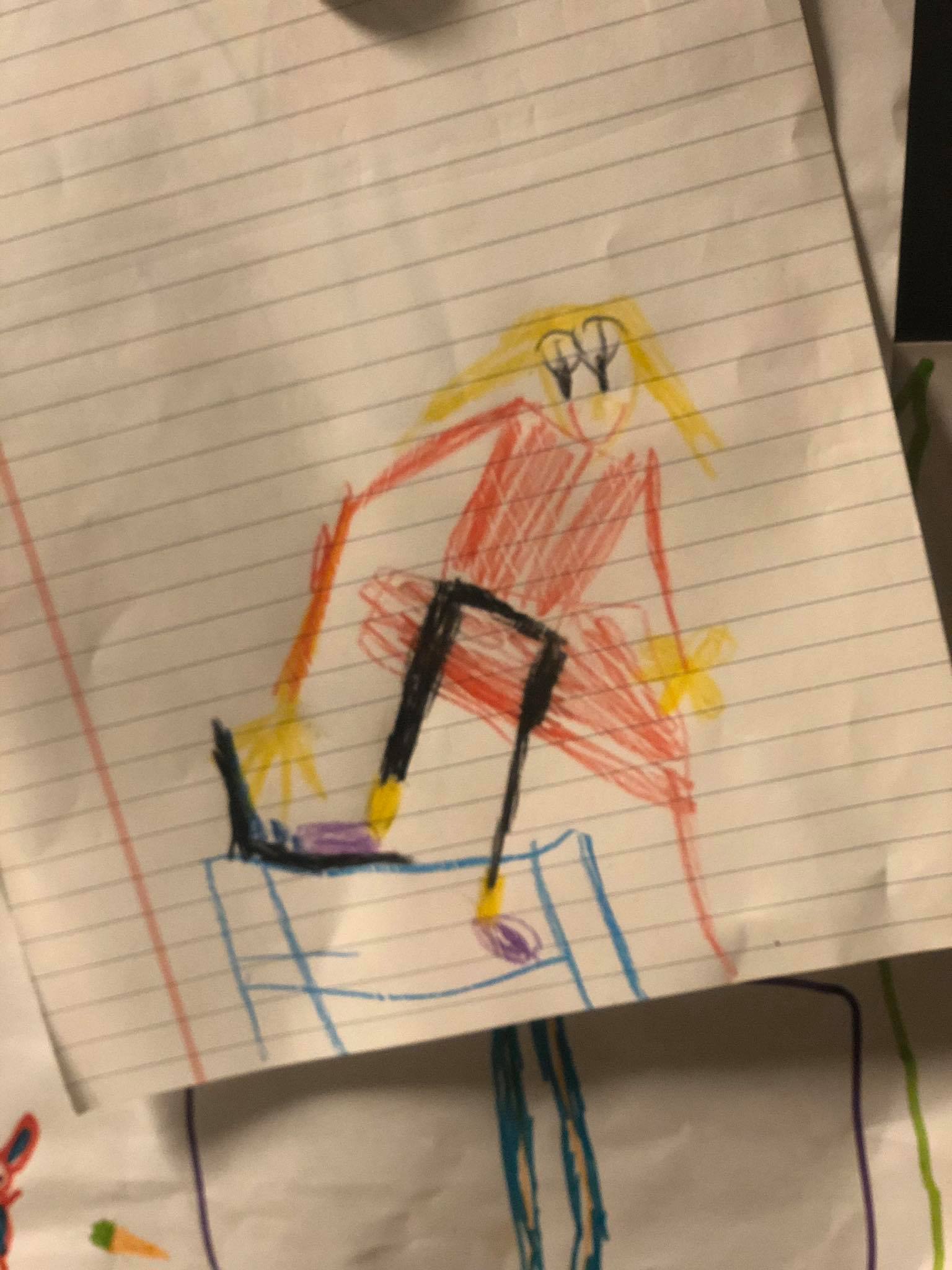
What is your impression of the way Croatia is dealing with the crisis? How safe do you feel?
The Croatian Government has put adequate measures in place in time. Communication is great, the organisation is too, the other day, the headquarters came to our apartment because we have Zagreb license plates [to check we were meant to be where we are]. Everyone really is doing their job. What concerns me are irresponsible citizens, on the one hand, they complain about the restriction of liberties, and on the other, they don’t know how to respect the elementary rules of conduct. That way, we keep going around in circles.
Now compare that to your home country and how they are handling it. What is Croatia doing better/worse?
Croatia definitely has better measures for entrepreneurs, for example, while for example, the Poles have better measures for the cultural sector, those who are self-employed and micro-entrepreneurs.
The Poles also introduced measures to further accelerate the implementation of investments such as exemptions from public procurement obligations for certain funds. A page has been created with all the measures and direct links for application, in Croatia, we have some announcements and additions to them every day. There is no single channel of communication.
In Poland, unfortunately, the ruling forces forcing the presidential elections in May are trying to take advantage of the situation. In addition, a number of legal measures are introduced, using a situation when everyone's attention is focused on the fight against COVID-19.
In Croatia, politicians behave correctly, I didn’t see anyone trying to score political points at the expense of the situation, finally, experts and those in the know joined the debate and subsequently organised the private sector.
In Poland, these initiatives are missing.
What's the one thing you wish you had taken with you into self-isolation?
My phone. To be able to hear from everyone and follow everything that happens.
What is one thing you have learned about yourself, and one thing you have learned about others during this crisis?
I’ve realised how much I’m missing out on the development of my children, since I’ve been working from home, watching them all the time, and only now am I understanding some of their behaviours, their rules. We have a much better relationship.
I always had it on my conscience that we had a bad business model because people, and their problems, were always my focus. Then many people assured me that the purpose of a business was to make a profit. When that profit disappears in one day, or one month, the people remain - business and life partners you can rely on. I think the crisis has convinced me only of the correctness of my views.
And secondly, I’ve not learned anything new, as there are always individuals who are struggling, they find solutions and they are great and inspirational people, and there is always a crowd that just criticises and senselessly discusses things.
These situations better highlight both categories of people, so it's a great opportunity to verify your friends and those on your list of business partners.
Thanks, Natalia. Stay safe and see you on the other side.
TCN is starting a new feature series on foreign experiences of sitting out COVID-19 here in Croatia compared to their home country. If you would like to contribute, the questions are below. Please also include a para about yourself and where you are from, and a link to your website if you would like. Please also send 3-4 photos minimum to This email address is being protected from spambots. You need JavaScript enabled to view it. Subject Corona Foreigner
If you would be interested to record a video version for our partners www.rplus.video please let us know in the email. Thanks and stay safe.
Foreigners Self-Isolating in Croatia: Do You Feel Safer Than in Your Home Country?
Firstly, how are you? Are you alone/with someone? Tell us a little about your situation and sanity levels.
What do you think about the economic measures the government is taking, are they helping your business? (PLEASE IGNORE IF THIS DOES NOT AFFECT YOU)
When did you realise that corona was going to be a big issue?
What is your impression of the way Croatia is dealing with the crisis? How safe do you feel?
Now compare that to your home country and how they are handling it. What is Croatia doing better/worse?
What about official communications from the authorities, compared to your home country?
What's the one thing you wish you had taken with you into self-isolation.
One thing you have learned about yourself, and one thing you have learned about others during this crisis.
TCN has recently become a partner in Robert Tomic Zuber's new R+ video channel, initially telling stories about corona experiences. You can see the first TCN contribution from this morning, my video from Jelsa talking about the realities of running a news portal in the corona era below. If you would like to also submit a video interview, please find Robert's guidelines below
VIDEO RECORDING GUIDE
The video footage should be recorded so that the cell phone is turned horizontally (landscape mode).
There are several rules for television and video news:- length is not a virtue- a picture speaks more than a thousand words
In short, this would mean that your story should not last more than 90 seconds and that everything you say in the report should be shown by video (for example, if you talk about empty streets, we should see those empty streets, etc.).
How to do it with your cell phone? First, use a selfie camera to record yourself telling your story for about a minute and a half. Ideally, it would be taken in the exterior, except in situations where you are reporting on things in the interior (quarantine, hospital, self-isolation, etc.). Also, when shooting, move freely, make sure everything is not static.
After you have recorded your report, you should capture footage that will tell your story with a picture, such as an earlier example with empty streets.
One of the basic rules of TV journalism is that the story is told in the same way as a journalist with his text. Therefore, we ask you for additional effort. Because we work in a very specific situation, sometimes you may not be able to capture footage for each sentence of the report. In this case, record the details on the streets: people walking, the main features of the city where you live, inscriptions on the windows related to the virus, etc.
The same rules apply if you are shooting a story from your apartment, self-isolation, quarantine. We also need you to capture footage that describes your story.
When shooting frames to cover your reports, it is important that you change the angle of the shot (in other words, shoot that empty street from several angles). Also, when shooting a detail, count at least five seconds before removing the camera to another detail.
The material should be about 5 minutes long (90 seconds of your report + frames to cover your story).
After recording everything, send us to Zagreb, preferably via WeTransfer to This email address is being protected from spambots. You need JavaScript enabled to view it.
Wash your hands.
Expats in Isolation Top 10 Croatia Experiences: Ionut from Romania in Split
April 12, 2020 - As people look for escape from the mental stress brought on by the corona crisis, a new series on TCN with local expats in isolation, looking back at their top 10 experiences in Croatia so far. We start with Ionut Copoiu from Romania in Split.
I have had a LOT of emails and messages asking if TCN could write about something happier than the constant corona updates. I hear your pain, but with so much (sadly bad) news to report and limited resources due to the crisis, this is not so easy. But then I thought of a nice series which might perhaps pique people's interests, focus on the happy stuff, and even unearth some hidden gems to explore at a later date.
Having done a very successful series with over 30 submissions from expats around the world on their self-isolation experiences in Croatia compared to what is happening in their home country, and then following that with a series on Croats in the diaspora with their corona viewpoint of their country of residence compared to the Homeland, perhaps a happier and more interesting series would be to look at expats here today and their top 10 experiences in Croatia so far.
We start in Split with Ionut Copiou from Romania, who has been here for 5 years now, running his own business making nautical jewellery with his wife, Mirela.
Here is Ionut's top 10. If would like to contribute to this series, contact us on This email address is being protected from spambots. You need JavaScript enabled to view it. Subject Top 10.
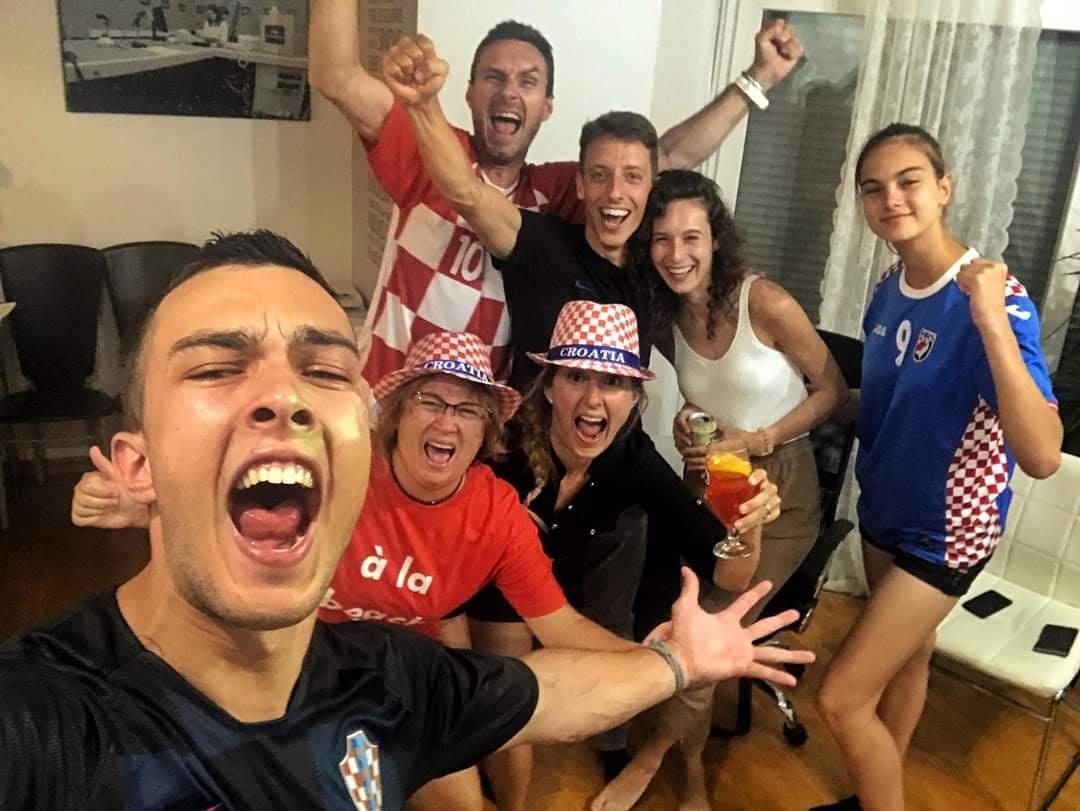
Living in Croatia during the 2018 World Cup is at the top of my list. Watching most of the games in the middle of the town surrounded by hundreds of Croatians and tourists and celebrating after each game in the streets - priceless! The game against England in the semi-final is still giving me goose-bumps.
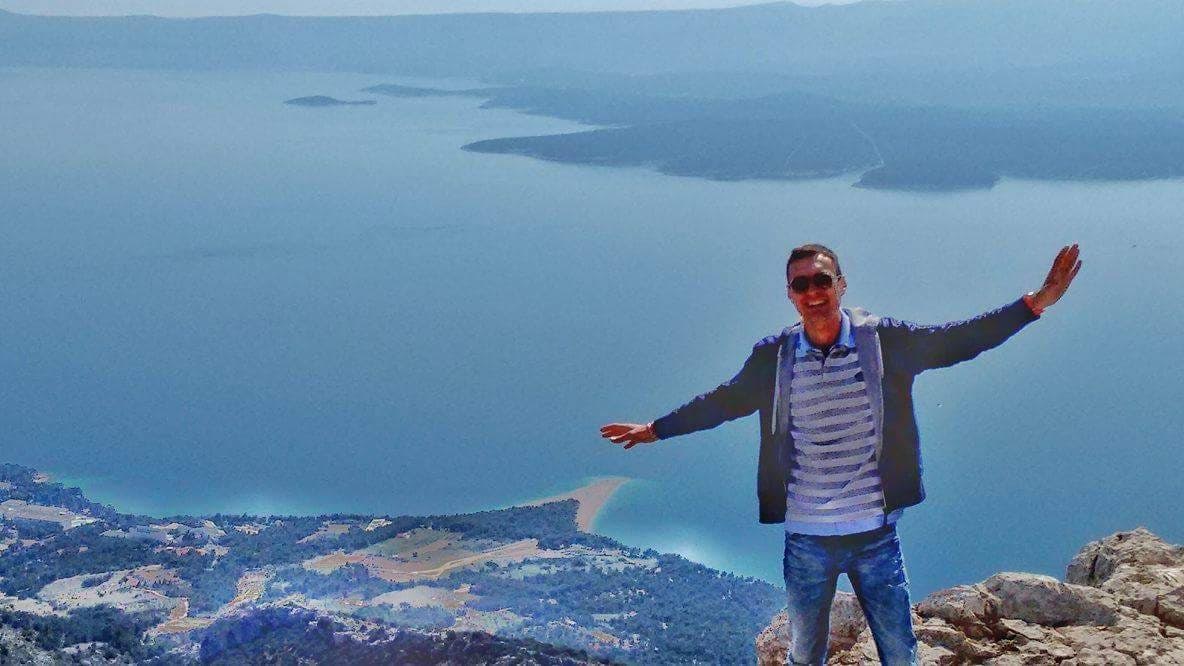
Visiting for the first Vidova Gora viewing point on the island of Brac was a breath-taking experience. The 180 degrees views of the blue waters of the Adriatic Sea and the islands gave me a feeling of being on top of the world.
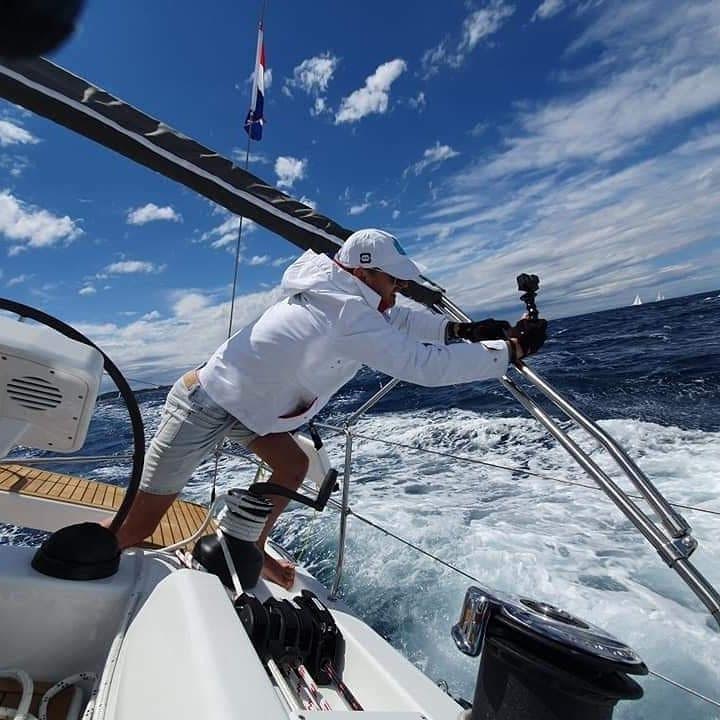
Being able to participate in regattas and experience sailing by competing with others while spending 5 days with good friends on a yacht.
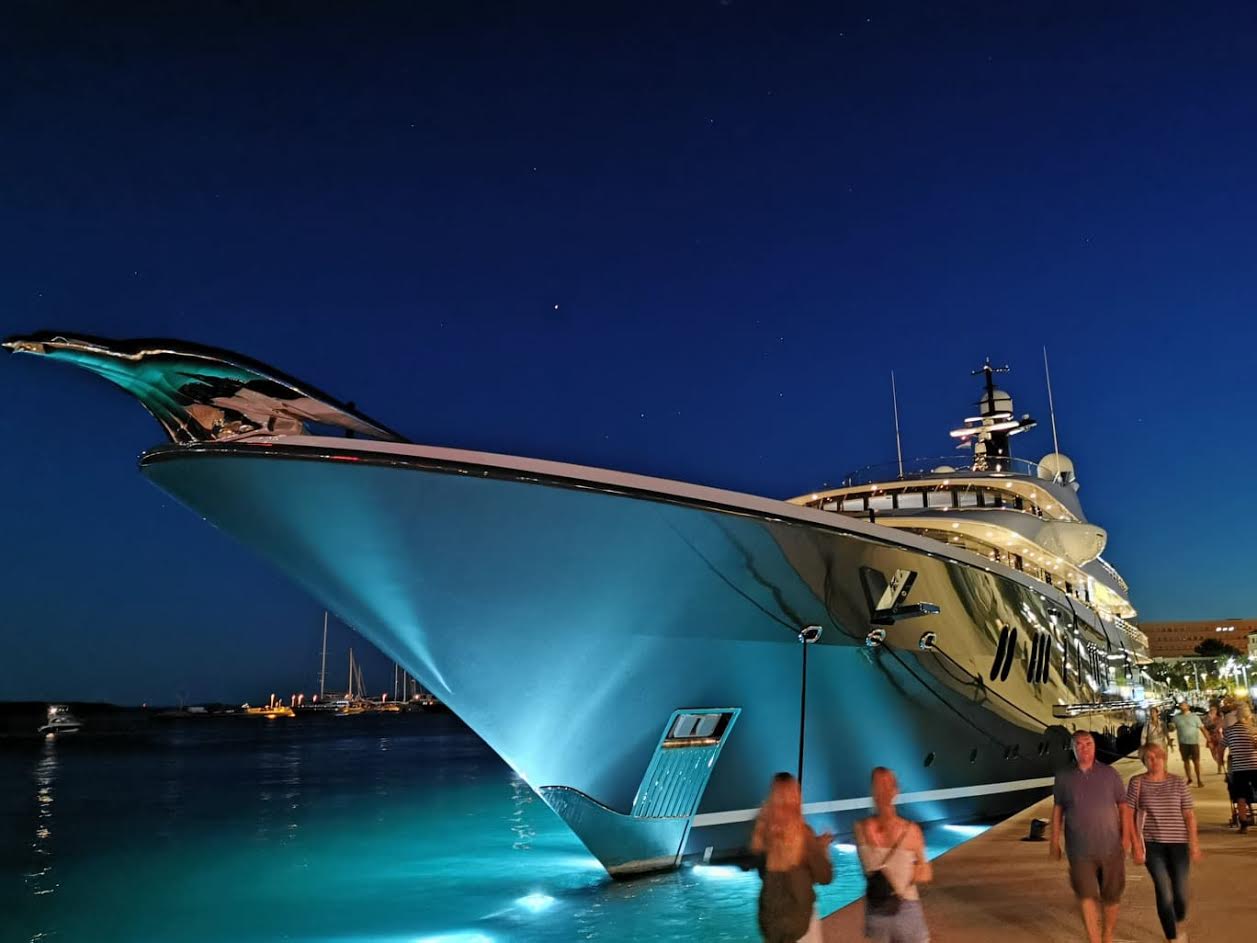
Exploring the west promenade of Split during the season and admiring luxury superyachts while having an ice-cold beer 10 meters away.
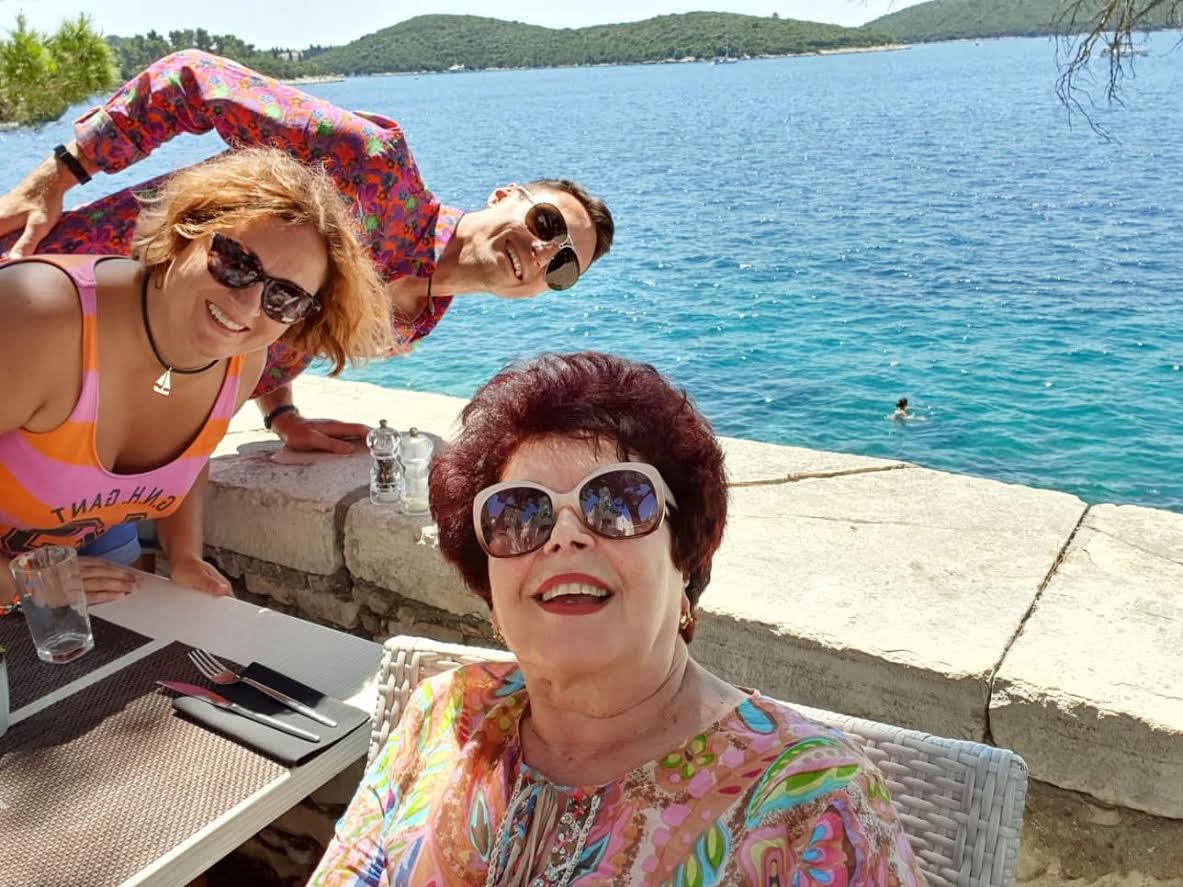
Bringing my parents over every year and build new memories is compensating for the fact that we now live 1500km away.
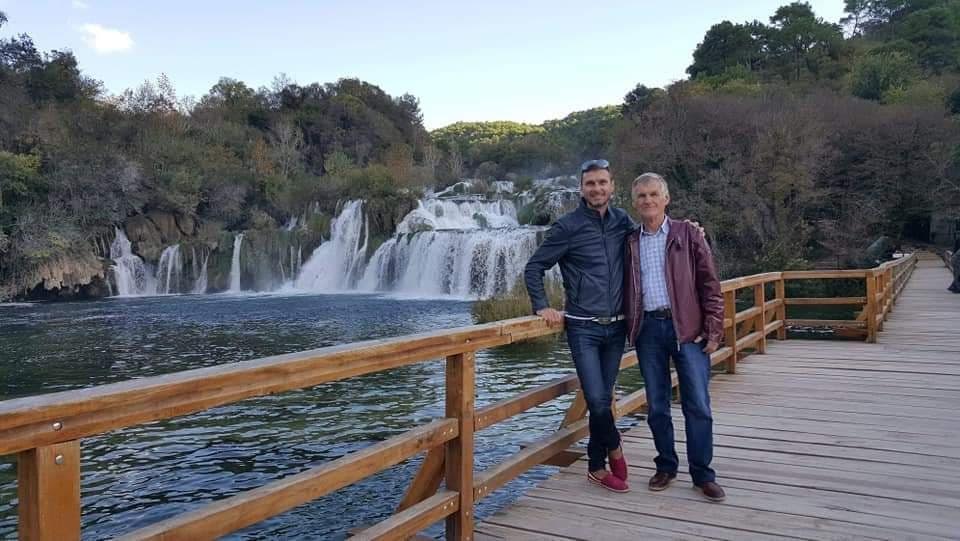
Waking up in the morning and having the possibility to jump on a yacht for a one-day sail and forget about work and current problems.
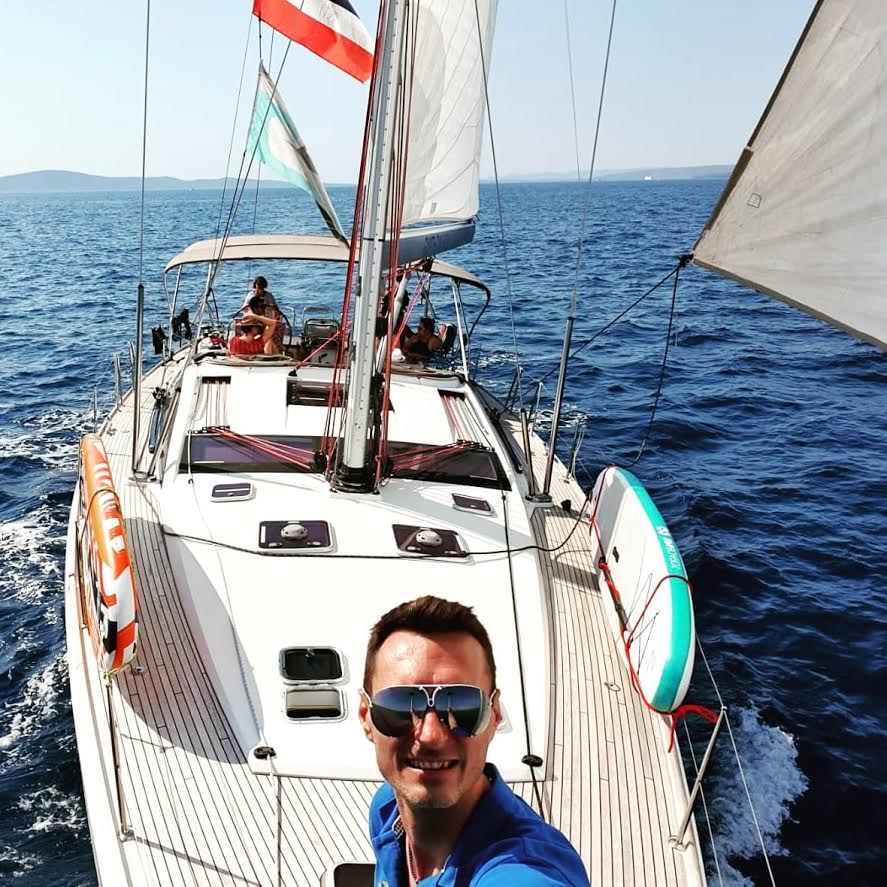
Celebrating New Year’s Eve in the old town of Split in the middle of the day each year, with artificial snow and music and all our friends.

Trips to Dubrovnik have always been a joy. One of the most beautiful coastal roads to get there from Split and once you are there, the Walls are every time very impressive.
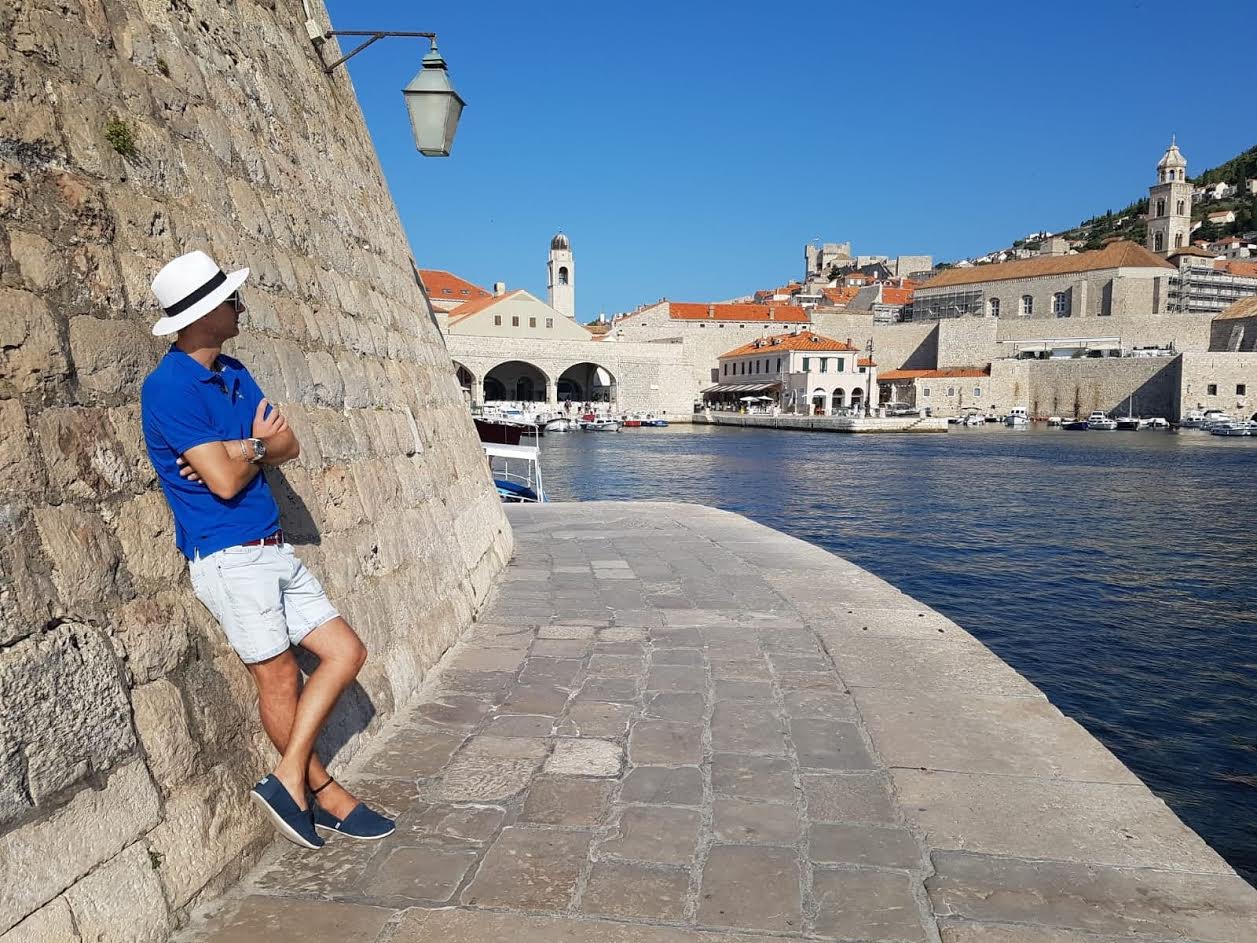
Being able to live in such a beautiful town like Split and walking almost every day in Diocletian’s Palace which is more 1700 years old...wow!
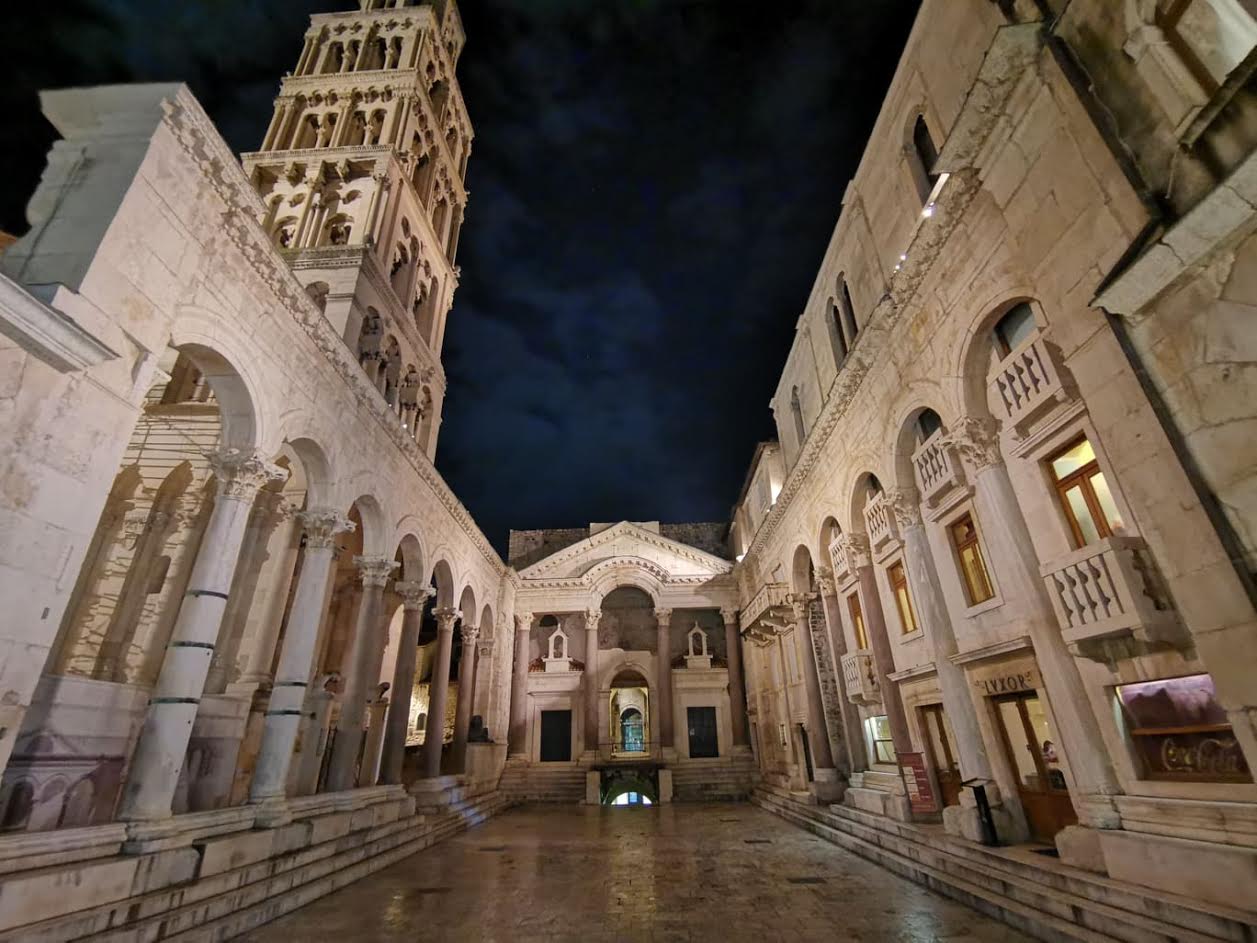
Seeing random people all over wearing the bracelets I make is still bringing me the same joy and excitement although is more than 4 years since this keeps happening. I hope it will never stop �
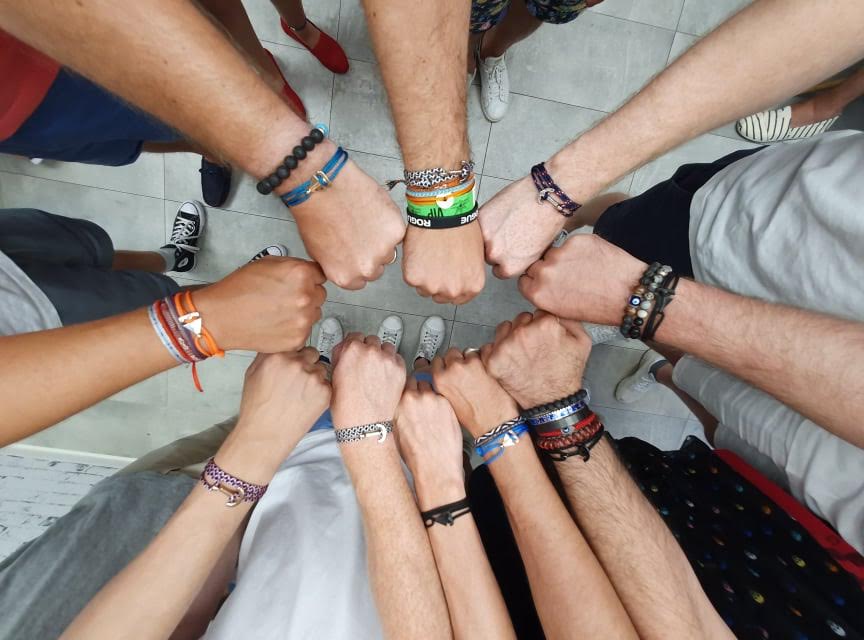
Thanks Ionut - it sounds like a fantastic life, and I am sure you will be back to it very soon when this madness is all over. If you would like to learn more about Ionut's fabulous nautical bracelets, visit his official website.
Are you an expat in Croatia with a little time on your hands and some fabulous memories and experiences to share? If you would like to participate in this series, please contact us at This email address is being protected from spambots. You need JavaScript enabled to view it. Subject Top 10.
To see the other stories in this series, as well as expat self-isolation stories compared to their home countries, and corona voices in the diaspora, visit the dedicated section.
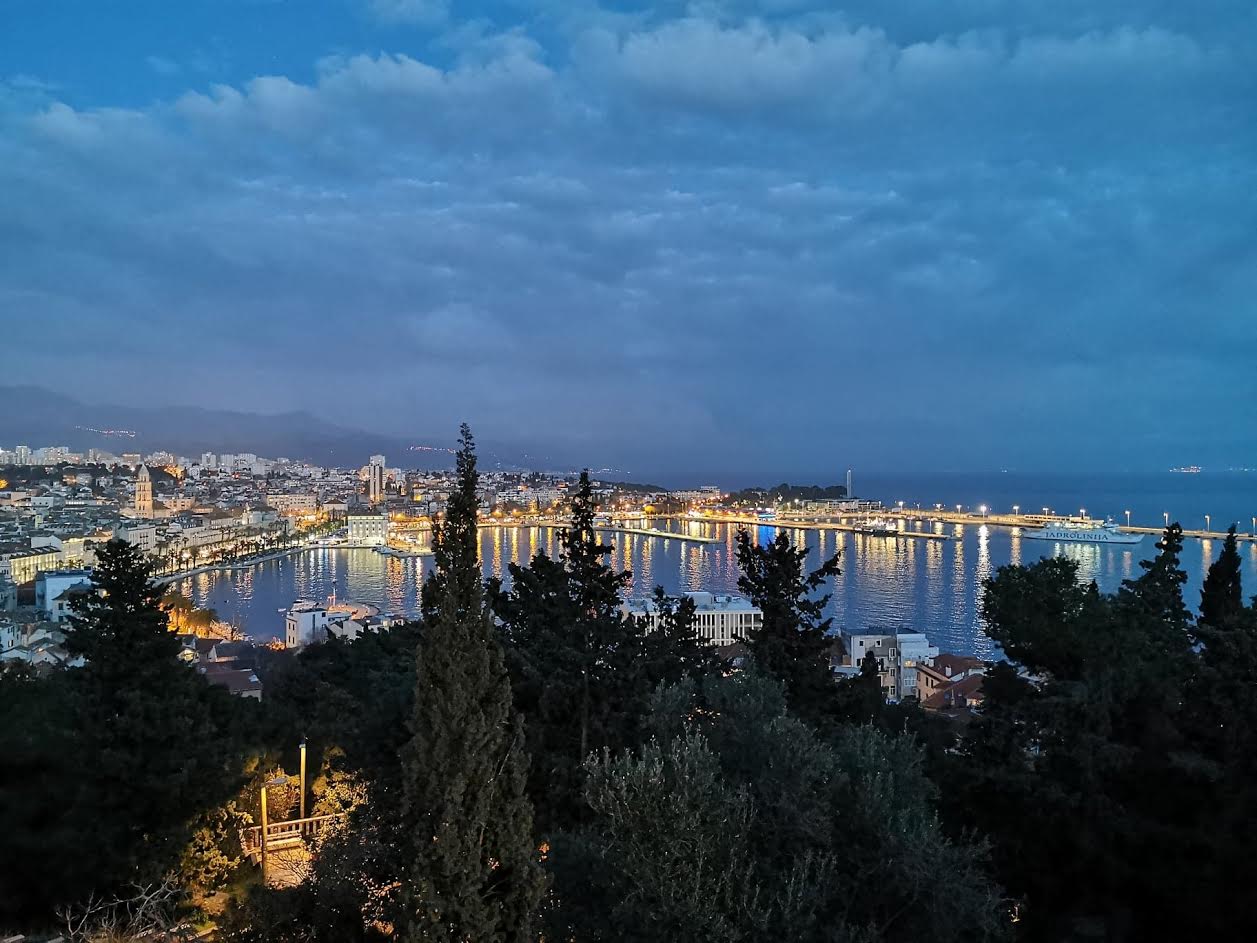
Shipment with 60 Tonnes of Protective Gear Arrives from China
ZAGREB, April 12, 2020 - A direct flight from China on Sunday brought to Zagreb around 60 tonnes of protective equipment for the Croatian health system and other services fighting the coronavirus epidemic, the Croatian government said in a statement.
The shipment, consisting of large quantities of protective masks, overalls, goggles, gloves and contactless thermometers, to be used for patient triage and diagnostics, arrived aboard a cargo plane of the Chinese company SF Airlines.
Attending the arrival of the plane were Health Minister Vili Beroš, Prime Minister Andrej Plenković's chief-of-staff Zvonimir Frka-Petešić, and Chinese Ambassador Erwen Xu.
The shipment was taken over by members of the Civil Protection Directorate who will distribute the equipment across the country.
So far this is the biggest shipment of protective gear from China since the outbreak of COVID-19. Several similar shipments are expected to arrive from China in the coming weeks.
The deliveries secure continued supplies for the Croatian health system and other services during the epidemic, the government said, noting that in procuring Chinese equipment it cooperated with two reputable state-owned companies - MEHECO and Sinopharm.
Today's shipment also includes a valuable donation of protective gear from the Chinese government, which was announced by Prime Minister Li Keqiang in a phone conversation with Prime Minister Plenković two weeks ago, as well as a donation of the Croatian community in China for the Red Cross Croatia, the government said.
More news about relations between Croatia and China can be found in the Politics section.

